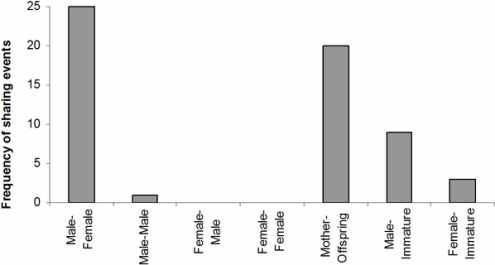Is chimpanzee food sharing an example of food for sex?
 One of the most important transitions in human evolution may have been the incorporation of regular food sharing into the day to day ecology of our species or our ancestors. Although this has been recognized as potentially significant for some time, it was probably the Africanist archaeologist Glynn Isaac who impressed on the academic community the importance of the origins of food sharing as a key evolutionary moment. At that time, food sharing among apes was thought to be very rare, outside of mother-infant dyads. Further research has shown that it is in fact rare ... the vast majority of calories consumed by human foragers in certain societies and at certain times of the year comes from a sharing system, while the fast majority of calories consumed by chimpanzees is hand to mouth without sharing.
One of the most important transitions in human evolution may have been the incorporation of regular food sharing into the day to day ecology of our species or our ancestors. Although this has been recognized as potentially significant for some time, it was probably the Africanist archaeologist Glynn Isaac who impressed on the academic community the importance of the origins of food sharing as a key evolutionary moment. At that time, food sharing among apes was thought to be very rare, outside of mother-infant dyads. Further research has shown that it is in fact rare ... the vast majority of calories consumed by human foragers in certain societies and at certain times of the year comes from a sharing system, while the fast majority of calories consumed by chimpanzees is hand to mouth without sharing.
A repost
Nonetheless, sharing among adults in both common chimpanzees and bonobos does happen, and the patterns of sharing are slowly emerging as research progresses. It seems that most of the food shared among common chimpanzees outside of the mother-infant dyad is meat, and this happens to very variable degrees in different study groups. In some cases meat sharing is facilitated by socially aggressive begging. Individuals with a large part of a monkey carcass will eventually give others a tiny bit of access if they are annoying enough. In other cases, sharing of meat is argued to be nearly systematic, vaguely r resembling what human hunters do with the meat they garner. Meanwhile, the sharing of plant foods among adults is very rare in chimps, but much more common in bonobos (see White 1996 for a comparison).
A paper recently published in PLoS by Hockings et al, regarding the chimpanzees of Bossou (Republic of Guinea, West Africa), documents and discusses sharing of plant foods among adult chimpanzees in a particular context. Here, adult chimps ...
...very rarely transferred wild plant foods. In contrast, they shared cultivated plant foods much more frequently (58 out of 59 food sharing events). Sharing primarily consists of adult males allowing reproductively cycling females to take food that they possess.
Why do they share cultivated food at a seemingly high frequency?
There are several factors that need to be considered in regards to sharing food. First is the overall potential for reciprocal altruism to arise in the context of foraging. Reciprocal altruism, which in theory need not rely on kin relatedness (but may occur in connection with it in real life) requires a number of conditions to arise, and all of these conditions apply to chimpanzees. For example, these organisms live a long time, frequently encounter the same other individuals on a regular basis, have a social system that would certainly allow for individuals to keep track of each other's "altruistic" behaviors, and which would provide a facility for punishing cheaters. There are things to share (food) and it is presumably not difficult to imagine a mode of keeping track of values of exchanges as well. If vampire bats can share blood meals, then certainly one would expect chimpanzees to have the cognitive and social prerequisites for food sharing.
So in a way, one might rather ask: Why do chimpanzees not share food all the time? One major difference between chimpanzees and vampire bats (who regularly share blood meals after foraging bouts, among non-relatives) is the nature of the foraging itself. With the bats, there is a great variation from day to day (well, night to night, actually) in the amount of blood obtained, and there is a high probability of literally starving to death if one fails to obtain a sufficient meal for several nights in a row. Additionally, there is probably not a lot of individual variation in the bats themselves that accounts for the unpredictability ... foraging success is simply a very random variable for them. In contrast, most adult chimpanzees manage to find sufficient food for themselves each day. When a given adult chimp is unable to find enough food, it is probably because there is a spatially broad seasonal shortage of food. In other words, all the chimps may fare purely or well in a given day, so the benefits of sharing food are typically low.
Another consideration related to sharing is "package size." One of the null arguments (meaning, in this case, the argument that there is not really anything interesting going on) with the sharing of meat among chimpanzees is the package size argument. Most fruits are small, so you can't share them, but meat comes in very large packages (compared to fruit). Therefore, no only can you share meat, but you might as well because there is no way you can eat it all yourself. The present paper does document a package size effect that may be part of the story: The main shared agricultural foods are large fruits.
There are some very large fruits native in the rain forest, but there is no clear systematically collected data indicating that these large fruits are shared. I studied the distribution and use of some of these fruits, and whenever I found evidence of chimpanzees eating them, the forest floor was always trampled down, with many sticks broken, lots of prints around, and fragments of the giant (water-mellon size) fruits scattered everywhere. Clearly, the chimps had had a party. Was it sharing? My gut feeling is no, but I have no idea how one would tell.
Another factor that the researchers seem to subtly indicate but do not explicitly state or explore (I suspect they had done so in earlier drafts but this is the kind of thing that would not make it past reviewers very easily) is that these fruits were not being gathered, but rather, hunted. A raid on an agricultural property is distinctly different from hand to mouth harvest of wild fruit. There are farmers who may be in inclined to shoot you or set dogs on you if you start messing with their fruit. The social value of items garnered in this context may be very different from regular wild fruit.
The researchers found that the majority of sharing among adults was adult males providing fruit to potentially reproductive females.
Sharing primarily consists of adult males allowing reproductively cycling females to take food that they possess. We propose that hypotheses focussing on 'food-for-sex and -grooming' and 'showing-off' strategies plausibly account for observed sharing behaviours. A changing human-dominated landscape presents chimpanzees with fresh challenges, and our observations suggest that crop-raiding provides adult male chimpanzees at Bossou with highly desirable food commodities that may be traded for other currencies.
Especially certain females.
Papaya raids occurred independently of the presence of females of reproductive age .... However, adult males shared crops - mostly papaya ... overwhelmingly with these females (23 out of 25 sharing events with females...), particularly with one cycling female (14 out of 23 events;...) who took part in 83% of all consortships with males.

This female was apparently giving it out for papaya. It is possible that this entire phenomenon arises from personality (or would that be panality) traits of specific inviduals acting in unique and innovative ways. Such quirkiness and innovation seems to be a feature of well studied chimpanzee groups.
The second-ranking adult male, who shared most with this cycling female (43% of all her sharing episodes), was also her most frequent consort (50% of consortships) and grooming recipient (50% of her total grooming time). In comparison, the alpha male shared less frequently with this female (14% of all her sharing episodes), and despite his dominance, was less likely than the second-ranking male to consort (36% of consortships) and receive grooming (43% of her total grooming time) from her.
It will be very interesting to eventually work out the actual fitness consequences of this novel an rare behavior of sharing of raided agricultural crops.
Hockings KJ, Humle T, Anderson JR, Biro D, Sousa C, et al. (2007) Chimpanzees Share Forbidden Fruit. PLoS ONE 2(9): e886 doi:10.1371/journal.pone.0000886
Click here to see the original paper!
White, Francis J. (1996) Comparative socio-ecology of Pan Paniscus. In "Great Ape Societies" Edited by William McGrew, Linda Marchant, and Toshisada Nishida. Cambridge. Pp 29-41.
Research Blogging Citation:
Hockings, K.J., Humle, T., Anderson, J.R., Biro, D., Sousa, C., Ohashi, G., Matsuzawa, T., Brosnan, S. (2007). Chimpanzees Share Forbidden Fruit. PLoS ONE, 2(9), e886. DOI: 10.1371/journal.pone.0000886
See also this: Forbid Us Something, and That Thing We Desire













Comments
Another study only tangentially related, as are most of my comments, can be found here:
http://www.plosone.org/article/info:doi/10.1371/journal.pone.0008901
Posted by: Jared | February 10, 2010 1:22 AM
Greg, is there an explanation for the lack of female to male sharing despite the high frequency of male to female sharing?
Posted by: Gyeong Hwa Pak | February 10, 2010 2:10 AM
So prostitution may predate the evolution of humans?
Posted by: MadScientist | February 10, 2010 6:48 AM
@ Gyeong: I imagine that, as in many species, the females do not need to share food with the males - the males are sharing the food in return for sex (to put it simply). Females are seen as being the choosier of the sex because they have more parental investment in any potential offspring, so it is up to the males to compete for their fertility. If the females are going to share with anyone, it will be their offspring because they have more investment in them than any potential mates. If a male gets to mate with a fertile female in return for some fruit, it's worth it in terms of his fitness. If a female were to share food with a male, it's unclear what benefits she would get from this.
Posted by: Dani | February 10, 2010 7:58 AM
Or, as EMJ puts it : "The larger story lay not in the fact that females preferred to mate with males who provisioned them, but that they were opportunistically shifting their mating strategies for their own reproductive interests.
[...]
Rather than such hackneyed cliches as "Sex sells, even in the rainforest" (Cosmos) or "The way to a chimp's heart is through her stomach" (both Wired and the Chicago Sun-Times) the real story was that female chimpanzees demonstrate flexible and opportunistic strategies to maximize reproductive success."
Posted by: BdN | February 10, 2010 5:04 PM
Sorry, forgot the link.
Posted by: BdN | February 10, 2010 5:06 PM
Greg,
Have you heard "What Can Animal Minds Can Teach Us About Human Consciousness?" on our public radio program The Really Big Questions. http://www.trbq.org
gbj
Posted by: gbj | February 11, 2010 12:33 PM
How difficult is it for chimps to aquire wild fruit? If the potential recipient of sharing could simply get her own fruit without significant effort, there seems to be little point in sharing.
Posted by: Arno | February 11, 2010 4:48 PM
Well, it is what they spend all day doing. There are times when it is plentiful, times when it is hard to find.
Posted by: Greg Laden | February 11, 2010 4:59 PM
#8 - I'd assume that unless the cost of acquisition is essentially zero it will always pay off to be the recipient - even at zero cost of acquisition it would probably be relatively safe to assume that obtaining more than you could otherwise obtain is likely to be better, in terms of your own (and your offspring's) fitness (at least for the female - the male's fitness depends on succesful mating therefore giving of food in this situation may impact actual survival negatively, but reproductive fitness positively)
Posted by: Ewan R | February 12, 2010 1:36 PM
Ewan ... yes, IF the females are not in any way at all competing with each other. If they are, there is a non-zero cost.
Posted by: Greg Laden | February 12, 2010 1:42 PM
I guess you missed the most recent research in which they tested different food CHOICES and sharing.
They didn't mention meat probably because contrary to what you seem to WANT to believe .. monkeys DON'T eat meat.
They found the monkeys REFUSED TO EAT when offered BETTER food UNTIL the OTHER monkies TOO were fed the SAME 'quality' food.
The scientists opined "they must wait until we are gone to beat those that do not share and THAT is WHY they share" ..
Real scientific and biased towards their WISH for 'lack of morality' which seems to permeate through the 'scientific' community and therefore hopefully ALSO in the animal kingdom.
THAT they hope would give some justification for their OWN .. lack .. of morality.
Imho ..
Imho ..
Posted by: Tom Hennessy | February 13, 2010 11:14 AM